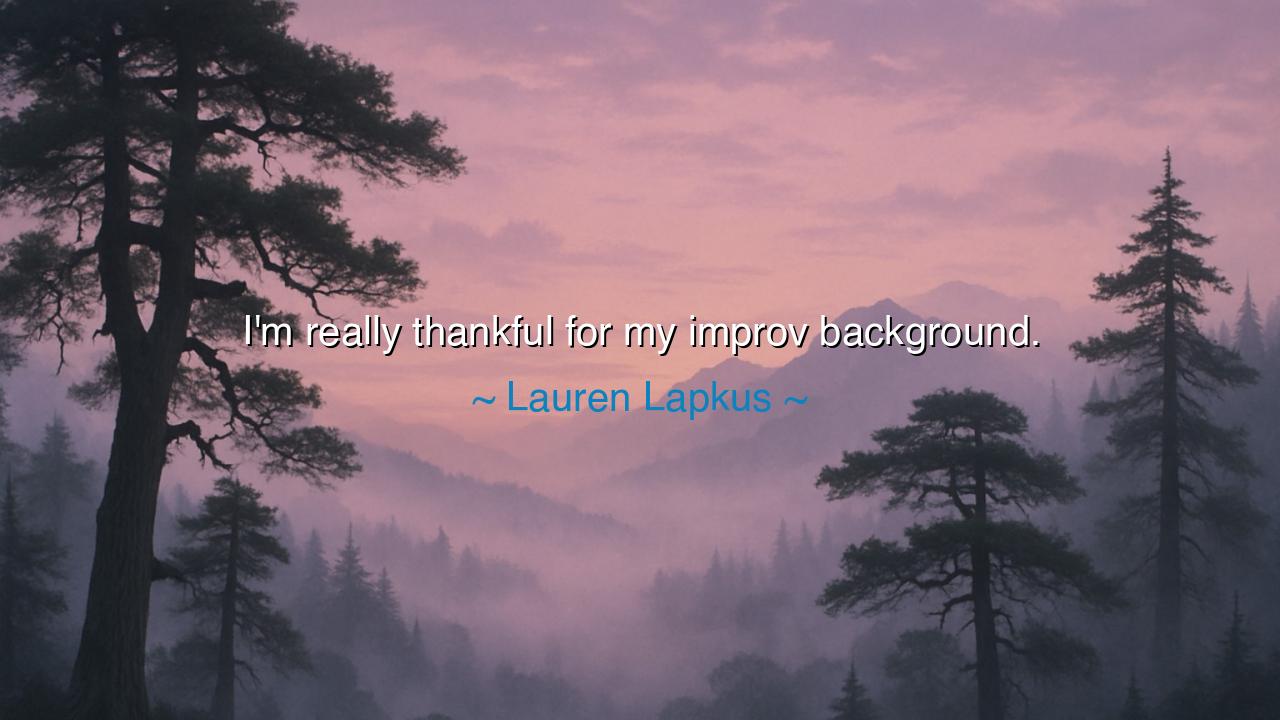
I'm really thankful for my improv background.






The words of Lauren Lapkus are simple, yet behind their simplicity lies a profound wisdom: “I’m really thankful for my improv background.” What she expresses is not merely gratitude for a skill, but reverence for a way of life, for improvisation is not simply performance—it is philosophy. It is the practice of standing in uncertainty, facing the unknown with courage, and trusting that the present moment contains enough to carry you forward. To be thankful for such training is to acknowledge that the art of improv teaches not only comedy, but resilience, adaptability, and presence.
The heart of improv lies in surrender and acceptance. Its first law—“yes, and”—demands that one receives what is given, no matter how absurd, and builds upon it. This principle, when carried beyond the stage, becomes a guide for life. For life itself often places us in unscripted moments, where plans collapse and certainty vanishes. Improv teaches us to embrace these moments, to say “yes” to what is, and to add our own response with creativity and courage. In being thankful for this background, Lapkus reveals that her strength as an artist and as a person has been forged in these very lessons.
The ancients knew this truth in their own way. The Stoics, like Epictetus, taught that life cannot be controlled, only responded to; that wisdom lies not in resisting fate, but in working with it. Improv is the artistic expression of this philosophy. Where Stoicism says, “accept what is given,” improv says, “yes, and.” Both are acts of freedom, transforming chaos into opportunity. Lapkus, though speaking of comedy, echoes these timeless teachings, showing that the improviser’s stage is but a mirror of the stage of life itself.
Her gratitude also honors the discipline of practice. Improv may appear spontaneous, yet behind it lies years of training—hours spent listening, reacting, building trust with partners, learning to silence the ego so that the scene may live. Such training teaches humility, for the improviser cannot succeed alone; every moment depends upon the contributions of others. To be thankful for an improv background is also to be thankful for the countless collaborators who shaped her craft, who gave her moments to build upon, who turned her “yes” into something greater than either could create alone.
There is also heroism in this art. To step onto a stage with nothing prepared, to face an audience with no script, requires bravery. It is the courage to fail publicly, to stumble and still continue, to trust that even mistakes can become treasures. This courage, once learned, does not remain on stage but follows one into life. Lapkus’ words carry this heroic undertone—her thankfulness is not only for career success, but for the strength of spirit that improv instilled within her.
The lesson for us is clear: cultivate improvisation in your own life. You need not stand upon a stage to practice it. In daily trials, when plans collapse, when unforeseen challenges rise, remember the law of improv—say “yes” to what is before you, and add your part to transform it. Be flexible, be creative, be unafraid of failure. Above all, listen—listen to those around you, for life, like improv, is a collective scene, and only by building together can it truly flourish.
Therefore, let us act with thankfulness for every skill and discipline that teaches us how to endure the unknown. Let us learn from the improviser’s craft, not only to laugh, but to live with courage and openness. For the wisdom of Lauren Lapkus reminds us that improv is more than comedy—it is a path to resilience, humility, and joy. And if we carry it in our hearts, then no matter what the script of life may bring, we will be ready to answer, “Yes, and…”






AAdministratorAdministrator
Welcome, honored guests. Please leave a comment, we will respond soon